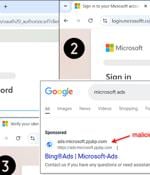Security News

Microsoft has disclosed details of a large-scale malvertising campaign that's estimated to have impacted over one million devices globally as part of what it said is an opportunistic attack...

Microsoft has taken down an undisclosed number of GitHub repositories used in a massive malvertising campaign that impacted almost one million devices worldwide. [...]

Cybersecurity researchers have discovered a malvertising campaign that's targeting Microsoft advertisers with bogus Google ads that aim to take them to phishing pages that are capable of...

Cybersecurity researchers have alerted to a new malvertising campaign that's targeting individuals and businesses advertising via Google Ads by attempting to phish for their credentials via...

A large-scale malvertising campaign distributing the Lumma infostealer malware via intrusive “ads” leading to fake CAPTCHA pages has been tied by researchers to a threat actor abusing the Monetag...

Cybersecurity researchers have uncovered an ongoing malvertising campaign that abuses Meta's advertising platform and hijacked Facebook accounts to distribute information known as SYS01stealer....

Malvertising is a shortened mash-up of “malicious advertising.” In a nutshell, malvertising is a relatively new cyberattack method in which bad actors inject malicious code into digital ads. These...

A new Google Ads malvertising campaign, coinciding with the launch of the Arc web browser for Windows, was tricking people into downloading trojanized installers that infect them with malware payloads. The Arc browser is a new web browser featuring an innovative user interface design that sets it apart from traditional browsers.

A ransomware operation targets Windows system administrators by taking out Google ads to promote fake download sites for Putty and WinSCP. WinSCP and Putty are popular Windows utilities, with WinSCP being an SFTP client and FTP client and Putty an SSH client. System administrators commonly have higher privileges on a Windows network, making them valuable targets for threat actors who want to quickly spread through a network, steal data, and gain access to a network's domain controller to deploy ransomware.

The malware loader known as PikaBot is being distributed as part of a malvertising campaign targeting users searching for legitimate software like AnyDesk. "PikaBot was previously only distributed...